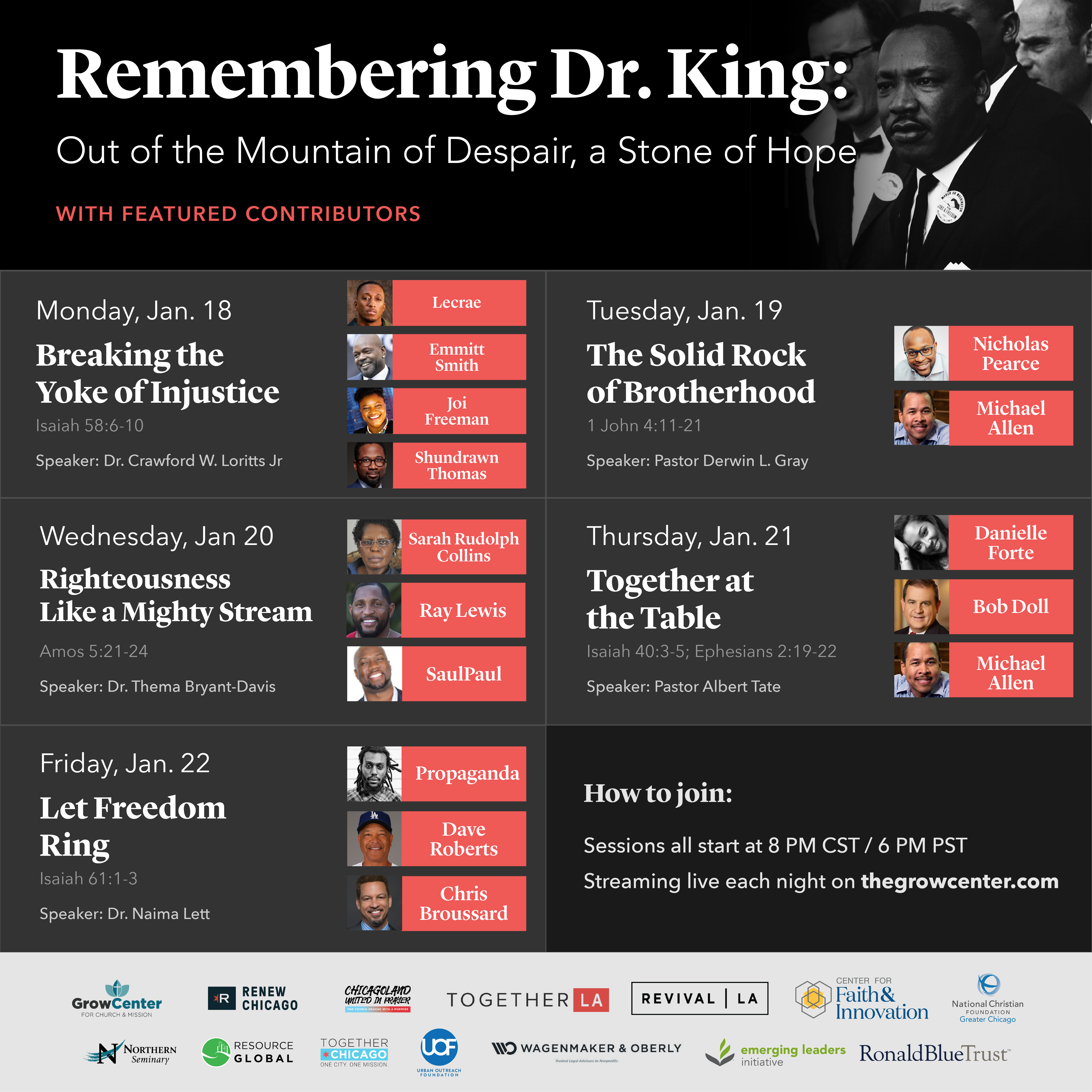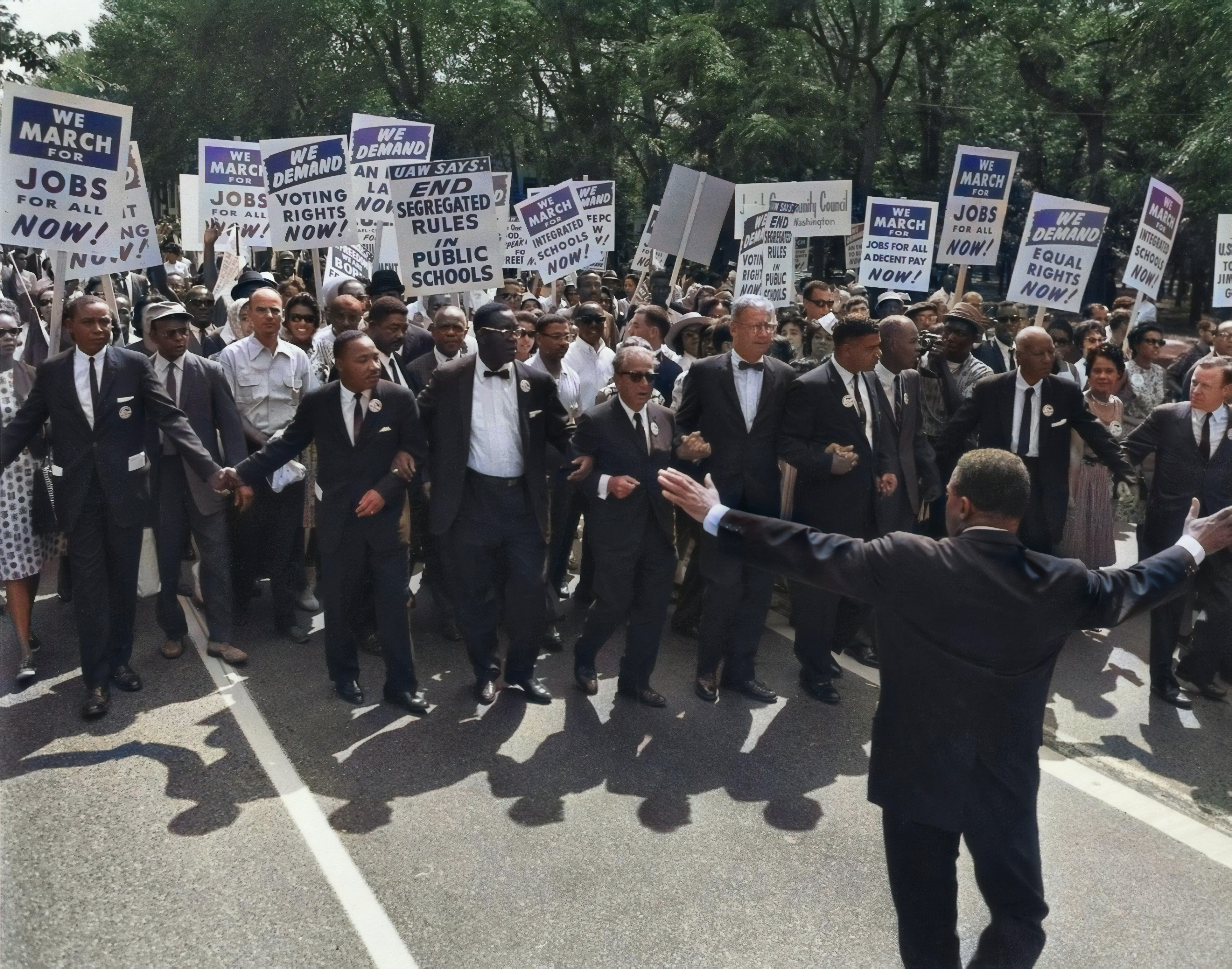Just 12 days after white supremacists proudly displayed their iconography in and in front of the Capitol building and violent attacks led to several deaths, America is celebrating a holiday to not only commemorate the life of Rev. Martin Luther King Jr., but inspire “Americans to reflect on the principles of racial equality and nonviolent social change espoused by [him].” For many, these past few weeks and 2020 have been a sore reminder that we are far from Rev. King’s vision of a ‘beloved community’. My hope is that these recent and deplorable events would cause our community to take with utmost seriousness the purpose of today, our call as the Church, and our presence in society.
As a white pastor of a predominantly white congregation, one of my traditions on MLK day is to first read a news article by several white clergy addressed to Rev. King and his movement then read Rev. King’s response to that article known as his ‘Letter from a Birmingham Jail’. Some context is helpful to understand why these are my documents of choice (among many other items). In the spring of 1963, Rev. King and a large number of his supporters were arrested after conducting demonstrations in Birmingham to end segregation. During these events, Rev. King’s campaign received national attention when fire hoses and dogs were used in response to their nonviolent group. Rather than accepting bail, Rev. King opted to stay in jail to help bring recognition to their cause, which subsequently became the fertile ground from which his famous letter would arise.
In response to the Birmingham events, a news article by several white clergy critiqued Rev. King’s movement by calling it “unwise and untimely,” urged him to “find proper channels to accomplish” his goals, and implored the “negro community to withdraw from [the] demonstrations, and unite locally in working peacefully for a better Birmingham.” In essence, their call was one of peace without justice. It was a call for the ongoing ‘patience’ of those experiencing oppression while, as Rev. King described it, ‘broken promises’ of healing and justice persisted from those calling for peace. In the words of Rev. King, the clergy represented…
“the white moderate who is more devoted to “order” than to justice; who prefers a negative peace which is the absence of tension to a positive peace which is the presence of justice; who constantly says “I agree with you in the goal you seek, but I can’t agree with your methods of direst action” who paternistically feels that he can set the timetable for another man’s freedom; who lives by the myth of time and who constantly advises the Negro to wait until a “more convenient season.” Shallow understanding from people of good will is more frustrating than absolute misunderstanding from people of ill will. Lukewarm acceptance is much more bewildering than outright rejection.”
Although Rev. King was accustomed to criticism, the article rightly caught his attention and, while in a Birmingham jail, Rev. King responded to the Alabama clergy. I encourage you to read both letters for yourself today.
There is a lot that can be learned from Rev. King’s letter, but one thing that caught my attention this year was his idea of ‘self-purification’ contained within his four basic steps to nonviolent action. Self-purification was a time in which the community prepared itself for direct action. It was a time of questioning, examination, and reflection. For Rev. King and his supporters, he describes conducting “workshops on nonviolence and repeatedly [asking themselves] the questions, “Are you able to accept blows without retaliating?” and “Are you able to endure the ordeals of jail?” Whether mental, physical, or spiritual, individuals prepared for whatever may come their way during demonstrations. Many also prepared themselves by modeling Jesus through prayer and fasting. King’s self-purification reminds me of the words of Lamentations 3:40, “Let us examine our ways and test them, and let us return to the Lord.”
Before I go any further, I need to get something out of the way. I am a recovering racist. You may not agree with why I claim this, but for me, growing up in our society as a white heterosexual male creates a much different experience and way of seeing the world than others who find themselves disadvantaged, targeted, and marginalized on a daily basis because of the color of their skin. That different experience can breed, at the very least, a complicity or blindness to racism. It leads to my own malformation and misunderstanding of others and the social dynamics they encounter. Have I actively sought to oppress, attack, or oppose others whose skin bears more melanin than my own? No. Have I joined or championed groups with racist ideologies? No. Yet, the intentional or unintentional neglect of these areas or my own malformation ultimately enables ongoing injustice and, therefore, I become a participant.
I mention that because I have found it too easy for me to assume that, were I alive and present during those events of 1963, I would have been an active ally of Rev. King and his supporters. Yet, upon honest reflection and sincere confession, whenever I read the article by the Alabama clergy, I know that there are thoughts, words, and phrases I could have easily echoed myself. Sadly, my gut instinct can often be to call for peace without justice, to use shallow calls ‘to love’ or unity as a way of ‘not rocking the boat’ or as a redirection from engaging much needed conversations in our community and church– which is really no love at all. In reality, my own experience means I probably more closely relate to the white clergy than to Rev. King.
Self-purification, then, goes deeper for me since there’s a need for unpacking and deconstructing how I have been malformed, have been blinded to injustice, have been taught how not to love my neighbor well. And, how through my actions or the lack thereof, my name is signed next to those clergy whose lukewarm acceptance bewildered Rev. King. In my experience, part of this process of purification has happened from a willingness to listen to the stories of others who are much different than myself, to learn from perspectives to which I have never been exposed, and to be challenged through the uncomfortable realities of others. The important thing is the willingness to humbly engage and not neglect.
This MLK Day, there is much work to be done in our communities and in our lives. May the life of Rev. Martin Luther King Jr. encourage us to self-purification and, in that space, be receptive to the work and transformation of God the Spirit. I wanted to make you aware of a phenomenal opportunity next week to listen and learn from a variety of diverse speakers through The Grow Center.
The Grow Center will be remembering Dr. King through a week of conversations featuring bible teachers and Christian ministry and marketplace leaders reflecting on different portions of Dr. King’s “I Have a Dream” speech. Will you join us for this historic week? Please mark your calendar to remember Dr. King together, Monday, January 18 – Friday, January 22 at 8 pm CST. (No need to register – just click the link below or join the event via The Grow Center website). Do not miss this opportunity to listen, learn, and act.
Stream the virtual event


